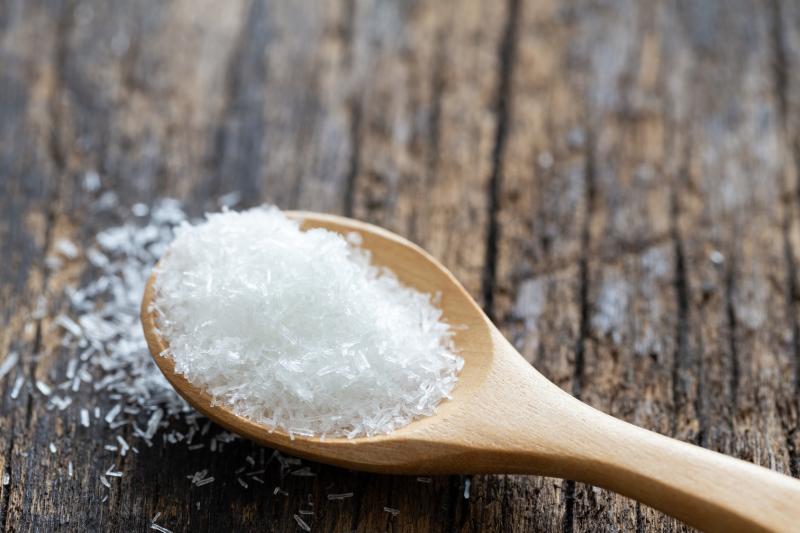
Monosodium glutamate (MSG, umami) improves the palatability of low-sodium soups, according to a recent Japan study, which may have significant implications in hypertensive individuals who are trying to reduce salt in their diet.
The researchers enrolled 584 healthy participants (88.1 percent female) who were made to taste 0.3%, 0.6%, and 0.9% sodium chloride (NaCl) solutions with or without 0.3% MSG. Tests were conducted in a room with mean temperature 22.5±12.6 oC, with mean water temperature of 23.7±1.92 oC. At the time of the test, most of the participants had not eaten for 2 hours after their previous meal. [Hypertension Res 2020;43:525-533]
Visual analogue scale (VAS) rating showed an increasing trend in saltiness according to NaCl concentrations. The perceived saltiness was significantly higher in the 0.3% (p<0.0001) and 0.6% (p=0.007) NaCl solutions with vs without MSG. No such effect was found in the 0.9% NaCl solutions (p=0.3013).
The relationship between NaCl concentration and perceived intensity of saltiness remained true independently of confounders such as age, sex, smoking status, fasting, and medication use.
Notably, researchers found that the effect of MSG was consistent for 0.3% NaCl, while varying according to participant characteristic for 0.6% NaCl. In no subgroup did MSG affect the perceived saltiness of the 0.9% solution.
In terms of palatability, VAS ratings showed superior performance of all MSG solutions relative to their controls. This was particularly strong for the 0.3% NaCl solution, where MSG almost doubled the VAS palatability score (60.9±0.9 vs 30.7±0.8; p<0.001).
In fact, the 0.3% NaCl solution with MSG earned the highest VAS score of all test solutions, followed by the 0.6% (57.4±0.7) and 0.9% (51.9±0.8) salt solutions with MSG, and then by the 0.6% (44.8±0.7), 0.9% (40.7±0.7), and 0.3% (30.7±0.8) salt solutions without MSG. This interaction remained true even when analysed according to different cohort characteristics.
“Regardless of the NaCl concentration of the test solutions, MSG significantly enhanced their palatability,” the researchers said. “In all groups, the palatability ratings of the 0.3% NaCl solution with MSG were almost twice as high as those of the 0.3% NaCl solution without MSG.”
“These results indicate that palatability enhancement due to the addition of MSG could not be explained only by the enhancement of saltiness due to the addition of MSG,” they added. “Although it should be considered that the complexity of taste perception in the brain may affect sensory evaluation, it is likely that MSG has the capability to compensate for the loss of palatability caused by salt reduction.”
Importantly, the findings indicate that adding MSG to low-salt soups may be able to support a healthier lifestyle without compromising on taste, the researchers said. “Utilizing an appropriate amount of umami in soup would contribute to improved human health.”
“The present study has several limitations,” according to eh researchers. “There were many sex and age biases, many of the participants had high health awareness, and the effect of selection bias should be considered.” Participants also seemed to prefer less salt in their daily meals, which may also have skewed the findings.